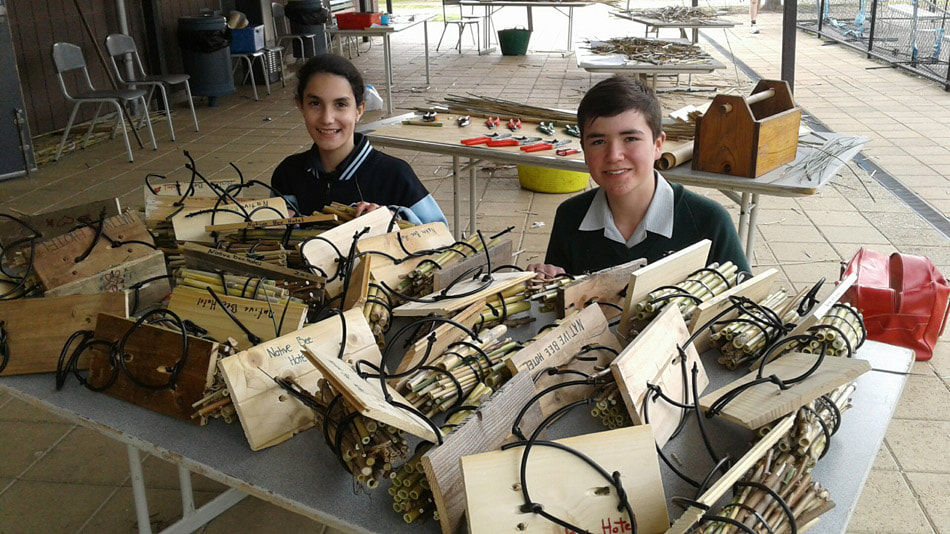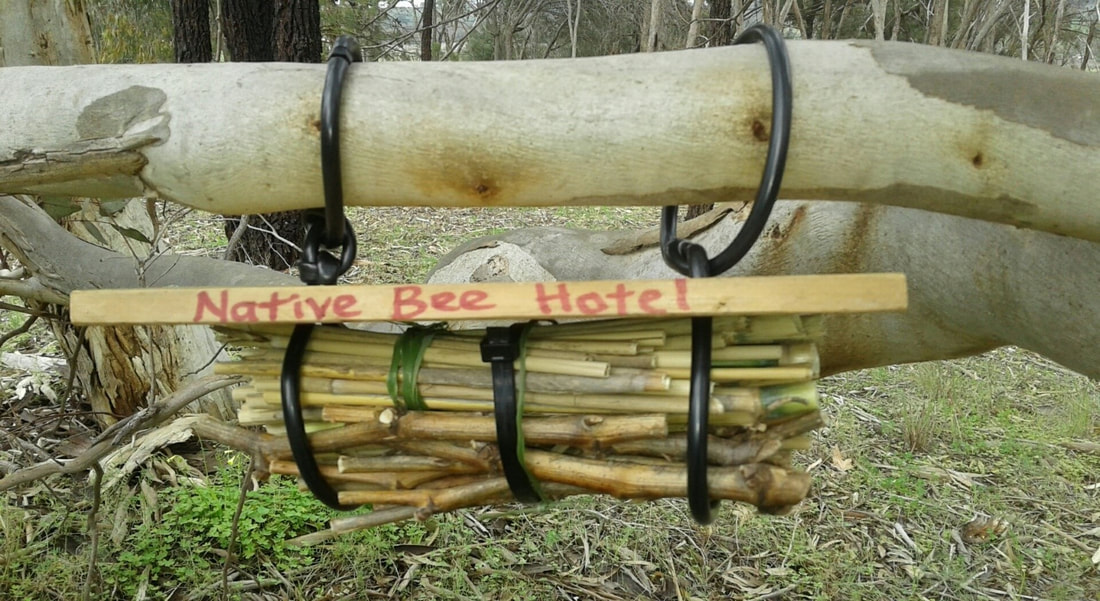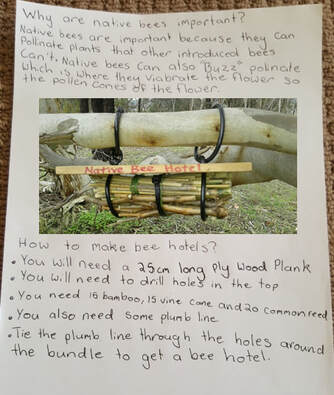Barossa Regional Event 2019
The Barossa’s two YEC students decided to create a regional event around native bees. Their aims were twofold: to raise awareness of the importance of native bees; and to have an on-ground impact by constructing native bee hotels.
With this in mind, the two students started networking to promote their idea. They spoke with their teachers and got their respective schools interested in being involved: suddenly over 50 Year 7 students from both schools were booked in to construct native bee hotels at our planned workshop. Then the two YEC students decided there was a need for a guest speaker at the event and moved right out of their comfort zones by contacting several native bee experts, eventually engaging a speaker. Hence we had the ingredients for an exciting day: the makings of a hands-on workshop; and a guest speaker to enthuse students.
Next the two YEC students met with their NRM Education Officer each week during lunch for a number of weeks planning and refining the day; their chosen guest speaker was invaluable in advance, sharing her experience via email regarding the structure of the actual workshop as well as the materials they needed to collect to construct the native bee hotels, and we gathered together large bundles of bamboo, vine cane and common reed, as well as recycled timber for the roof section.
The actual event was held at Tanunda Primary School and was a huge success: some 43 native bee hotels were created on the day and nearly 90 students took part; in addition the outdoor workshop aroused the curiosity of just about every Tanunda PS student during recess and lunch and the students held an impromptu lesson to one class which had expressed interest on the day.
Having now created so many native bee hotels, the question arose of how best to spread them around the Barossa for optimal biodiversity benefit. NRM Education Officer Chris Hall suggested that the native bee hotels could be hung to best advantage in trees within the Tanunda Urban Forest site, of which Tanunda Primary and Faith Lutheran College, the two participating schools, both form a part. Tanunda Urban Forest is a strategic Barossa Council/community/NRM project to enhance and protect urban greenspace centering around and buffering a heritage-listed Native Pine woodland.
The most pleasing aspects of this Regional YEC Event were:
With this in mind, the two students started networking to promote their idea. They spoke with their teachers and got their respective schools interested in being involved: suddenly over 50 Year 7 students from both schools were booked in to construct native bee hotels at our planned workshop. Then the two YEC students decided there was a need for a guest speaker at the event and moved right out of their comfort zones by contacting several native bee experts, eventually engaging a speaker. Hence we had the ingredients for an exciting day: the makings of a hands-on workshop; and a guest speaker to enthuse students.
Next the two YEC students met with their NRM Education Officer each week during lunch for a number of weeks planning and refining the day; their chosen guest speaker was invaluable in advance, sharing her experience via email regarding the structure of the actual workshop as well as the materials they needed to collect to construct the native bee hotels, and we gathered together large bundles of bamboo, vine cane and common reed, as well as recycled timber for the roof section.
The actual event was held at Tanunda Primary School and was a huge success: some 43 native bee hotels were created on the day and nearly 90 students took part; in addition the outdoor workshop aroused the curiosity of just about every Tanunda PS student during recess and lunch and the students held an impromptu lesson to one class which had expressed interest on the day.
Having now created so many native bee hotels, the question arose of how best to spread them around the Barossa for optimal biodiversity benefit. NRM Education Officer Chris Hall suggested that the native bee hotels could be hung to best advantage in trees within the Tanunda Urban Forest site, of which Tanunda Primary and Faith Lutheran College, the two participating schools, both form a part. Tanunda Urban Forest is a strategic Barossa Council/community/NRM project to enhance and protect urban greenspace centering around and buffering a heritage-listed Native Pine woodland.
The most pleasing aspects of this Regional YEC Event were:
- this was a student-centred initiative: the idea was the students’ own idea, and they ran the workshop; the role of the local NRM Education officer was largely facilitatory, ‘creating the space’ for their ideas to be realised
- the peer teaching aspect: the YEC students effectively ran the event, giving briefings, short speeches, introducing the speakers, as well as instructing students on the creation of the native bee hotels
- strategic community outcomes: the involvement of multiple stakeholders in both the workshop as well as in the housing of the native bee hotels, including two schools, BushforLife, and Tanunda Woodlands Group; the on-ground outcome in that the native bee hotels were hung around four sites within the greater Tanunda Urban Forest site, thereby value-adding to the biodiversity component of this urban project; and finally the publicity gained (articles in two local papers) which has raised local awareness of the value of native bees as pollinators and their habitat needs.




